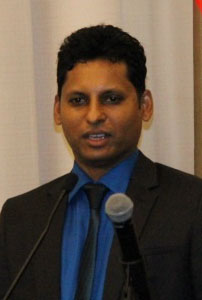Saying that a stable political environment is crucial for doing business, Guyana Manufacturing and Services Association (GMSA) President Shyam Nokta yesterday called for government to uphold the constitution and end ongoing “uncertainty and unease.”
“What is most critical is a stable political environment and one which is conducive for doing business. In recent weeks, we have heard concerns expressed by leading private sector institutions regarding investor confidence and decline in commercial activity while calling for adherence to the Constitution of Guyana and the rule of law,” Nokta said in his address at the organisation’s Annual General Meeting, which was held yesterday at the Guyana Marriott Hotel, in Kingston.
“The GMSA wishes to align with these views. There should not be a prolonging of the current uncertainty and unease,” he added.
Nokta appeared to be referring to the recent call by the Georgetown Chamber of Commerce and Industry (GCCI) for “national leaders” to resolve the present political uncertainty, which it says has seen a significant decline in commercial activity. Additionally, the Private Sector Commission (PSC) has called for adherence to the constitution and the observance of good governance.
Nokta said there are signs of decline in the performance of major traditional sectors of the economy and that there was no indication that this trend would not continue or at least slow down.
“This also held true for the manufacturing sector, which contracted during the first half of 2018 by 2.4% when compared to a 9.9% growth in the same period for 2017, primarily due to declines in the production of sugar and rice. Even light manufacturing reflected a slowing down from the 3.0% growth recorded in the first half of 2017 to 1.2%, for the corresponding period in 2018,” he stated.
Notwithstanding, the GMSA President pointed out that the “light manufacturing sector” has held its own for several years now, contributing between 6% to 8% of Gross Domestic Product despite significant challenges that are not new to the sector. Credit for the consistent performance of light manufacturing, he noted, must be given to both pioneers in the industry, which have grown over many years, as well as new businesses, which have come into the fold. “This combination of large, established businesses, medium-scale and new businesses, and with our embrace of small businesses – especially in the agro-processing sector – has helped to make the GMSA stronger, and to continue to be one of the leading Business Service Organisations in Guyana,” he said.
Nokta said that he hoped with recent initiatives taken, such as with meeting with government to brainstorm on solutions, could see many longstanding challenges being addressed. These challenges include the high cost and unreliability of the energy supply, high taxation and inadequate infrastructure that hinders access to remote communities.
Nokta pointed to the initiatives such as the Ministerial Roundtable Discussions which started in 2017 and the agency’s recommendations and discussions for input into this year’s budget.
“Similar to the Forestry and Wood-Processing Sector, we put in place a Joint Technical Committee, co-chaired by the Government of Guyana and the GMSA, and which meets bi-monthly with a programme of work to address critical issues affecting the Agro-Processing sector from policy-related matters to project initiatives. This mechanism has proven useful in helping to share information and perspectives and to advance collaborative actions and has helped foster a functional working relationship between the GMSA and the Government of Guyana. It is my hope that this mechanism can continue to function and grow, whichever political party is in government, as it has certainly demonstrated that public-private partnership is possible at a strategic level,” he said
He said too that in the GMSA’s presentation to the Minister of Finance for the 2019 national budget, it put forward a menu of 50 measures covering broad areas, such as taxation, access to finance, public procurement, energy, standards and regulations, among others. Sector-specific measures were also proposed. “We are of the firm belief that such measures, if implemented, could help stimulate the economy and help to boost manufacturing,” he said.
However, Nokta added that while some measures put forward will be helpful to manufacturers, the overall business environment and ease of doing business has not been significantly enhanced in recent years and this, ultimately, will affect all businesses.
The guest speaker at the event was the Inter-American Development Bank (IDB) representative in Guyana Sophie Makonnen, who said that for a thriving and transparent private sector there should be revenue management and plans which show how government will incorporate new resources into the economy. She said that she knows that the current government is working on “mitigating these macroeconomic risks with new policy frameworks.”
Makonnen also believes that productivity-enhancing policies will be important to strengthen the non-oil economy, even as she mentioned that numerous surveys have identified challenges in doing business here.
She noted that there are multiple policy fronts in addressing and strengthening this country’s private sector competiveness. “For one, streamlining and improving government services in the areas of electricity bureaucracy and transparency could significantly contribute to improving the business climate and competiveness. Secondly, policies intended to strengthen infrastructure and connectively could also be beneficial. Lastly, human capital development in both education and health are general considered to be great if not the most important productivity enhances for economic diversification,” she said.
Makonnen listed several areas in which the IDB has been working with both government and the private sector to develop this country. “The context of the private sector in Guyana is complex, with several impediments to growth. Our work is aimed at addressing these impediments to improve competitiveness, capitalise on the upcoming oil boom and unleash the private sector’s potential for more growth and economic development,” she said.










